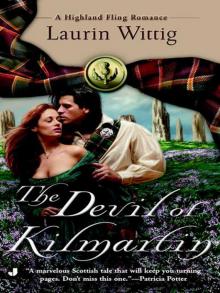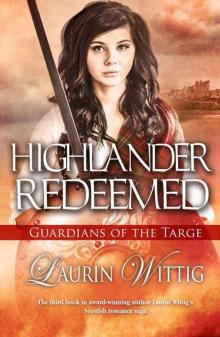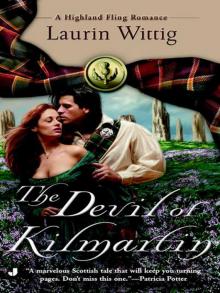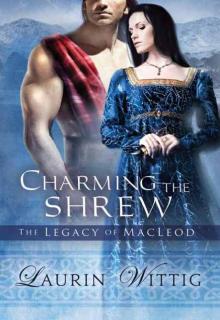- Home
- Laurin Wittig
Charming the Shrew Page 4
Charming the Shrew Read online
Page 4
“Are you?” he asked.
“What? Oh, going to pelt you?” She shook her head and turned back to the loch. “You are safe enough, though there are plenty of rocks to hand should I have need.”
“Warning taken. I thought you might need this.” He draped a cloak over her shoulders.
Ailig’s calm voice contrasted with Broc’s condescending tone as sharply as the sky contrasted with the mountain peak. She wanted to throw herself into his arms and let him comfort her as he used to do when they were children, telling her stories of his stays in Edinburgh to take her mind from the badgering of her elder brothers. But she had long ago sworn not to show weakness to any of them again, not even to Ailig. She pulled her cloak tightly about her and turned her attention back to the loch.
“The snow is further down the mountain this morning,” he said. “’Twon’t be long before it fills the glen.”
“’Tis why this is happening now, is it not? Winter is upon us, but not quite?”
Ailig nodded. “No doubt.” He rested his arm across her shoulders and pulled her close. “I would not have kept such news from you had I known.”
Catriona shrugged, unable to speak lest she give in to that softness she kept buried deep inside her, safe from hurt. Broc’s blusterings and taunts never threatened her control like this brother’s gentle caring did. She had not cried since her twelfth summer, yet Ailig’s simple gesture brought tears that clogged her throat. But she would not allow them to fall. She leaned her head on his shoulder, accepting the comfort she would not ask for.
“What will you do?” he asked after a moment.
Anger swamped her again. Catriona took a deep breath and stepped out of Ailig’s embrace. She drew the cold air into her lungs and wrapped her anger back around her like a heavy cloak.
“I will not marry Dogface MacDonell. There is no advantage there for me, nor for the clan. Indeed, the only advantage is to Broc, who will rid himself of the thistle in his shoe, and to the MacDonells, who will gain the advantage of our strength and reputation.”
“Aye, I see it the same.”
“Then why is Father allowing this?”
Ailig shrugged then tossed a few stones into the water. After a moment he turned to her. “I think Father tires of Broc’s complaints and the constant rows between you. You refused to choose a husband for yourself—”
“None were—”
“I know, but you have given him little choice. He must marry you to anyone he can convince to take you before it becomes Broc’s responsibility at midsummer.”
Catriona winced. “So I am to be punished for speaking my mind. Do you truly believe this should be my fate?”
“Nay, I do not. I have spoken with Father and the rest of them time and again, but you know they do not listen to me any more than they listen to you.”
She turned her back to him, unwilling to let him see how the truth of his words hurt her. Truly they were both invisible as far as Father and the other brothers were concerned. Well, she wasn’t completely invisible, but only because she poked and prodded everyone by speaking the truths no one wanted to hear. Ailig was invisible, though. He was quiet and thoughtful and disinclined to brawl with the other four. ’Twas an unfortunate thing, neither being seen nor acknowledged, making one bitter and angry, though Ailig seemed to tolerate it better than she.
When she had control of her voice again, she faced him once more. “What was your counsel that they did not heed?”
She could tell he was considering his words carefully, probably seeking the kindest way to say something he knew would anger her, for even Ailig was not exempt from the slice of her tongue now and again.
“Speak, brother.”
“Very well. I suggested they seek an abbey that would take you, else find you a husband from a far distant clan who would not know of your…reputation.”
“So you would hie me off to strangers too.”
“Aye, but for your own good, not Broc’s. You might be happy in a place where you could start anew, a place where they may come to value you beyond your connections to this clan. A place where you could begin fresh.”
“I do not need to begin fresh. This is my home, and I’ll not forsake it for Broc’s pleasure.”
Ailig shook his head. “Nay, but you will forsake it for your own pride.”
“Nay!”
“Aye, lass. You fight so hard against Broc you see naught but that which causes him the most grief. For once think what may be best for you. Is it staying here and being forced to marry Dogface? If you refuse to change your path, you will marry him and neither you nor the clan will benefit. If you choose for yourself what you will do, then what does it matter if it suits Broc’s plan as well?”
“Whatever are you blethering about?”
“I am simply asking you to look beyond baiting our brother and think. How can you turn this to your advantage? If you cannot, then you will be wed to Dogface. The banns will be called a week hence. Three days after, Broc will have won—and you will have lost all that you might have wished for in this life.”
Ailig moved closer again, taking her shoulders in his hands, forcing her to look at him. “My sister, your sharp tongue is like spark to tinder for most who know you. Do not underestimate Duff MacDonell. He’s not one to take a tongue-lashing from anyone, and he will not bother with the petty tricks of brothers. I fear for more than your happiness with that one.”
“Do not worry. I’ll not marry him—nor any MacDonell. Ailig, you remember…”
“Aye, but Triona, you’ve brought this upon yourself, refusing those few lads who dared ask for your hand in marriage. Da is desperate, and Broc pushes him to remove you from Assynt.”
“But there are others I could wed. We have allies who have sons. One of them will surely—”
“Do you really think Da would risk an alliance by sending you into a friendly clan’s midst?” He shook her, then released her shoulders and paced away from her. “Even you do not know what you will say next. If you would only stop and think before you speak, then there might be a chance for you to be happy.”
“I do think.”
“Aye, but not until after the trouble is done and there is naught to do to fix it. Your heart is good, Triona. But your heart is not strong enough to overcome your mouth. Nay, Da cannot chance that mouth on a friend.”
Catriona found herself speechless. Ailig spoke the truth about many things. Why should she think he spoke less than the truth about her?
He stepped forward, embraced her, then placed a gentle kiss upon her forehead. “Think, Catriona. Think. The MacDonells will be upon us in a sennight, and you must decide what you will do before then. Your future depends upon it, and you do not have much time.”
“Broc has seen well to that.” She looked up into her brother’s pale gray eyes. “’Twould be better for everyone were you the eldest brother.”
Ailig gave her a sad smile. “But I am not. ’Twould take nothing less than a king’s command to see me leading this or any other clan.”
Catriona’s heart lurched. Of course. “Then get one.”
“What?”
“Get the king’s command. You are well known to the Bruce’s brothers, are you not? You told me yourself how you spent time in their company in Edinburgh.”
“Those were but tales. I spent time in the places—”
“If you were to go to King Robert and explain that you are the only brother fit to lead—”
“I will not.” The hard edge to his voice, so unfamiliar, stopped her, forced her to really look at him. “I will not go to the king with such talk. My duty is to the MacLeods, to Assynt. Where is your duty, Catriona? What is best for the clan in this?”
Startled by the coldness in his voice, the sharp glitter in his eyes, she could only stare as he turned and strode back to the castle.
CATRIONA STOOD BY the loch for a long time after Ailig left, trying to think, trying not to panic, trying to understand what her brother had cou
nseled her to do, and why he refused the obvious solution to both their problems. Ailig was forever saying that which you expected, but also saying that which didn’t reveal itself until later. Where she met the challenge of her other brothers and her indifferent sire head-on with temper and verbal barbs, Ailig kept himself apart from the fray, nudging them all in the direction he deemed best with a word here, a subtle expression there, and sometimes by his silence. But he was not silent this time. Nor was he subtle.
Her life was over and the clan would surely come to harm if she did not find some way to change her father’s mind. She wished for neither, and she had precious little time to avert disaster. She’d not see the MacDonells drag the MacLeods into the muck that was Clan Donell’s lot in life. ’Twas surely a misplaced loyalty on her part, but she could not do less than what was best for her clan. She was daughter to the chief, and despite her trials with her brothers she had a duty—it had ever been her duty—to safeguard the clansfolk, even, as was the usual case, when it meant protecting them from Broc, their future chief.
Daft idiots.
But what was she to do? She needed a plan.
She could find another husband and have the banns read before Dogface’s arrival. She shook her head. Even if there was a man she could imagine being married to, none of the lads she knew would have anything to do with her. There were no lads within a day’s ride of Assynt who would ever consider marrying her.
And none she could stomach being married to, even for the good of the clan.
An abbey then, and the religious life. Poverty, chastity, and obedience. She shuddered. She was not suited to such an existence and well she knew it. Poverty she could survive, but she wished for children of her own someday—a wee one who would love her for herself alone—and obedience? ’Twas not one of her strengths. And if she could not obey? At least with Broc she knew what to expect for retribution and had her own successful ways of dealing with it. Retribution in God’s house would be another thing altogether, and she had no wish to test it. No, the restricted life of a nun would not suit her at all, never mind that ’twould leave Broc with no one to check his lunacy. Nay, she was needed here as long as Broc or the sheep were in charge.
Then what? Marriage or the abbey were a woman’s only choices unless you were that rare herb-witch who lived alone in the deep wood. She turned and faced the gray hulk of Castle Assynt. For all the annoyances of her family, the thought of living forever alone, truly alone, not just lonely, made her quake. She did not wish to live without the company of people—even the MacDonells would be better than that…perhaps. But the clan…
Catriona could not move as her thoughts twisted round and round on themselves, writhing and tangling like a basket full of snakes—and just as vile.
There was no escape. She could see no way out that was not horrid to consider. Marriage to Dogface or life in the abbey. She had no one to turn to for help, no one to even give her a moment’s pity. The only thing that she could do was to be so awful, so horrible, so completely unwilling as to make Dogface change his mind about marrying her. But the thought of facing him made her tremble, and that weakness made her furious. She clasped her hands to still them. Nay, she would not face him.
Anger boiled through her veins, heating her until she was pacing the shore in long, fast strides, searching for something to throw, something she could hurt the rest of them with as much as thrusting her into Dogface MacDonell’s arms would hurt her. She could not give herself to him. She would not.
She would die before she would leave Assynt with Dogface—or he would. There must be some way…
Sudden realization filled her with hope and dread. She had no choices left. She must not be in Assynt when Dogface arrived. She couldn’t be. If she temporarily removed herself from her home, she could thwart Broc and Dogface. A memory shimmered in her mind from a time long past. She had wished for a sister or a mother, but she had neither of these. She did, however, have one aunt, her mother’s sister who lived in a village near the sea. She had traveled there once when she was little, before her mother died. ’Twas not far to the sea, and they were kin. If Catriona asked for her aunt’s hospitality, she could not refuse. She’d leave in the morn and would arrive before nightfall. No one would think that she would go there.
Satisfied that she had found at least a temporary solution, she drank in the view once more. She would leave, for her own purposes, as Ailig had counseled, and all would be well.
After all, if she stayed she would have no choice but to stab Dogface in his sleep.
TAYG MUNRO SAT on a wobbly three-legged stool in the great hall of Dun Donell Castle, his back comfortably near the fire, his shallow drum resting on his thigh. He smiled at the small crowd gathering about him.
It had taken him three hard days to get to Dun Donell. The weather had remained clear, though cold, else it would have taken him days longer. He’d stayed in a village of MacKensies the first night. It had been uncomfortable since he was well-known there and was greeted as a hero. He had behaved as Robbie would have. Indeed he’d been grateful for the necessity as many lasses, some too young even to wed, had plied him with drink and a few had offered more than wine or ale. None of these lasses knew aught but that he was the Tayg of the songs and tales the bards and seanachean were spreading about—that he was to be chief of Munro, and he had a bonny face. ’Twas nothing they knew of him.
He had taken his leave gratefully and traveled hard until he came upon another village where he passed yet another uncomfortable night, though for different reasons. He had enjoyed his newfound anonymity, though his first foray as a bard had not gone well. He had taken his leave before sunup. From there he had traveled hard directly to Dun Donell, wishing to get this task done so he could get on with enjoying a more leisurely trek through the Highlands. He had arrived well past the early setting of the sun, and he planned to stay but one night as well, not wishing to chance discovery of his true identity.
But for now he must make a better show of being a bard. It wasn’t as easy to impersonate one as he had thought ’twould be. People had expectations, and he certainly hadn’t lived up to them at the last village. Thank goodness his natural charm had enabled him to bluff his way through the evening. This time he had a better idea of what needed doing.
First he would sing an old ballad, something melancholy and familiar to those gathering about him. Then he’d tell a story or two. He could tell stories all night long. ’Twas the singing and the playing that vexed him. After the stories, he’d sing a slightly livelier tune, and then he’d move into the news and gossip. If he gauged it right, a few songs would be all he needed to get him through the evening—and none of them would be about Tayg of Culrain.
Well then, to begin. He took a long swig of ale to bolster his courage and began the rhythmic beating of the drum. When he thought he’d got the beat going well enough to add the complication of a tune, he began to hum the melody. Perhaps he could get the growing crowd to sing with him so his voice would not have to carry all on its own. He hummed a bit louder, but no one joined in.
When he decided there was no putting it off any longer he launched into the sad song, only to realize he was beating the drum too quickly. Stumbling over the words as he adjusted the tempo, he noticed a few surprised looks on the faces around him. A child giggled, and he felt his cheeks heat. What had he been thinking when he decided to do this?
He stumbled over the words again and lost the beat. Pulling his thoughts back to the song, he drew it to an early close, took another long pull of the ale, and went with his strength.
“As you can see, I’m not much of a singer.” Scattered laughter met him, and he tried not to mind. “But I am an excellent storyteller, one to rival the king’s own.” He flashed his smile at a lass sitting close, and was rewarded with a dimpled grin.
“What story will you tell?” she asked.
“Ah, what sort of story would you like?” he asked the crowd, searching the faces there for any possibi
lities.
“One with monsters and gore!” yelled a lad with a dirty face and a tangled mop of blond hair.
“Ah, you wish to hear of the English then, and Longshanks, their dearly departed king?”
A loud chorus of boos and hisses had him grinning.
“A story of war and victory!” someone yelled.
“A love story!” yelled a lass from the other side of the circle.
“Ah, I have just the thing,” Tayg said, anxious to avoid any stories that might refer to him.
“And ’tis true, too. Have you heard the tale of the mad chief and the fair healer? Nay? Well then, gather round, and I’ll tell you about the evil doings way down to Kilmartin.”
Tayg launched into a story he had heard shortly after the miraculous recovery of King Robert last winter, though he did his best to embellish the love story with as much intrigue and horror as he could. When he ended, the crowd applauded and begged for more, so he told a story of a man who had come from the mists of time to claim his own true love. This tale was full of swordfights and miracles, and he had the crowd firmly under his spell right up to the very end when the villain was sent off into a blast of fire. This time the crowd erupted into cheers, and Tayg felt very pleased with himself. Maybe this wasn’t so hard after all.
“Tell us another, bard.”
“Aye, soon. For now, though, I am hungry and the smell coming from those platters is most appealing!”
The crowd looked around, apparently surprised to find the food had been brought into the hall without them noticing. Everyone agreed with him and scrambled to seats. Tayg placed the drum carefully on the floor next to his stool, then sauntered over to a table, finding a place where he could view the entire hall while he ate.
He settled himself in between two pretty lasses, one blond, one auburn-haired. Both giggled when he grinned at them. As he reached for a platter of small pies, a hush fell over the crowded hall.

 Devil of Kilmartin
Devil of Kilmartin Highlander Redeemed (Guardians of the Targe Book 3)
Highlander Redeemed (Guardians of the Targe Book 3) The Devil of Kilmartin
The Devil of Kilmartin Charming the Shrew
Charming the Shrew